This is Mr. KrisC, on his fathers’ boat out of Provincetown. Mr. C. comes from a long line of Portuguese fisherman and his people have been fishing these waters for five generations. We have made a wonderful living because of it, as have the previous generations.
The industry is dying, however. Everybody sees it, and it affects us all.
Hold your breath and dive into the big blue below the fold……
The fishing industry is very well regulated and since the adaptation of on-board global positioning systems, very well managed. Most of the fishermen I know and love are respectful of the regulations, the ocean and its’ marine life. However, dragging the bottom of the ocean or over-fishing has serious consequences, which of course, results in fishing ground depletion. The fishing village of Provincetown has become more of an LGBT destination since the town people have had to move from the fishing industry into a seasonal tourist mecca.
The fish market that once thrived on the pier has closed while a lone cold storage truck awaits the catch from the incoming boats. Sail boats and small motor craft are slowly replacing the large and rusty, iron ladies usually named after the owners children.
Therefore, it is increasingly necessary to move away from state waters into federal waters in order to find the catch. That requires that the boats be larger, to fare the open sea, trips become longer in order to reach the fishing grounds and the permits become more expensive since the catch is increasingly dwindling. It is the typical American nightmare (as opposed to the American Dream), the larger corporations, in this case, the larger commercial boats take over the market and close out the smaller family run businesses.
The owner of a large commercial dragger or trapper holds permits in both state and federal waters, is given an amount of fishing days for each permit and is given a schedule of when and where he can fish/drag/trap. He is also given limitations to his catch and a minimum size requirement, just as in recreational fishing.
These regulations are constantly being reviewed and changed in accordance to the stocks themselves. There are “open area” trips where boats with these types of permits have an alloted amount of time to catch as many bags of (let’s say) scallops in that time as possible. The captain is given specific coordinates to fish and is heavily fined if he is caught outside of these coordinates. This is closely watched by GPS.
There are also (very expensive) permits for “closed area” trips. This is an area that has been closed for a certain amount of time to replenish its’ stock-scallops require 7 years for example. These are usually the best type of trips, reaping the best tasting fruits and retrieving the highest price per pound. These trips, too, are heavily regulated and sometimes require an “observer” from the Division of Fisheries. They will record data pertinent to that specific area for future regulations. Observers also watch that the crew are not taking anything other than what they are permitted to take.
This is the type of boat Mr. C. works on and is gone for 16 days at a time, he is on one right now, as a matter of fact.
I’m sure many of you have seen the Discovery Channel’s “Deadliest Catch”, it’s an awesome series. The Discovery Channel has also been airing “Lobster Wars” filmed in the vicinity of Georges Bank filming boats from Mass. and Rhode Island. These are great depictions of a fisherman’s life. I am proud to be a part of this amazing lifestyle, even though I await my husband with bated breath. (Umm, ewww!) (What the hell is “Bated” breath anyway?)

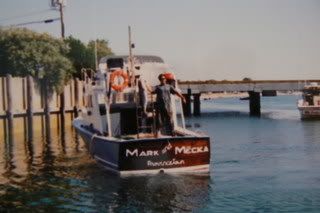
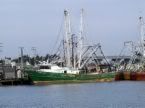
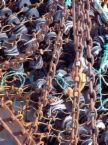
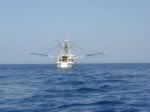
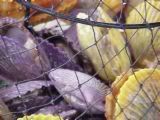
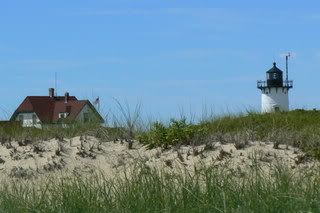
38 comments
Skip to comment form
Author
Don’t forget to tip your waitress!
into the trials and tribulations of the fishing life. I live in San Francisco and frequently read about the problems the fishermen are having. There are always big issues around crabbing and the exact date the season opens and whether the fishermen are going to strike because the price is too low. There are many other problems, but I don’t always keep up with them. I assume farmed fish may also create a problem, but perhaps that’s just here in California.
outstanding job of covering the seas and fishing a couple of months ago. Great essay…it’s always important to remember the huge amount of effort that goes into fishing, from small fisherman to larger companies. The risks are high, the dangers many, and too many ways the small fisherman is screwed over by the government.
Yummy ~ fish for lunch!
Sure would taste better than my ham & cheese on whole wheat that I made this morning!
Author
I forgot about that one….“Global Fisheries Crisis”
Thanks SallyCat! Good “catch”, heh!
terrific piece, krisc. much appreciated. i’m originally from maine, and recall well the implosion of the cod fisheries.
the vastness of the oceans, and how little we understand them apart from their near-surface conditions, is mind-numbing. i applaud the efforts of those who derive their living from the oceans in a manner that aims for a sustainable approach.
i’m kicking myself for not recalling the name of the company, but i came across a demonstration booth at the san francisco ferry building farmer’s market this past weekend. they were handing out samples of shrimp; they were so good, they made my knees buckle. anyhow, they’re sourcing stuff from around the pacific and atlantic that are certifiably sustainably caught or farmed. snagged some of their literature, too. it included some nifty graphs that illustrated the concept of carrying capacity. cool stuff.
with luck, i’ll recall this once i get back home later, and drop a follow-up comment here with their name and website address fyi.
thank goodness it’s not “baited”!!! 😀
What a tragic story on every level. Thanks for sharing it.
I’m way south of you in SC, but I’m also in a dying fishing village. Mostly shrimp here, but whiting, flounder, clams & crab are sometimes available. When we moved here in ’99 there were four packing houses/ docks. We’re down to one dock that sells too much imported stuff & ships SC shrimp elsewhere. The shrimpers (all independent) were getting 1.75/lb for 32-40’s earlier this year, yet when I went to the fish market they were 6.95. I quit buying from the market & now but directly from the men. They get more & I pay less.
We do have a clam farm now & 2 soft-shell crab places, but they only have enough work for their own families.
How is the lobstering? I read a book about lobsters and about how NYC had been surrounded by fresh oyster beds and essentially survived and thrived due to the oyster. Maybe that’s where the phrase, the world is my oyster, came from.
Isn’t ocean fishing another item that might be best placed on a global conservation/economic table for future stewardship and management?
I went on a whale watch this year and saw humpbacks and a basking shark (definitely worth a google – they are enormous, very slow, plankton eating sharks). I want to be able to know that sea life is thriving. Instead, I fear that we are about to kill off sea life forever, as well as the livelihoods of those who fish.
Thanks for writing this very interesting and thought-provoking essay, KrisC. And safe home always!
The scallops look heavenly.
The problem of over fishing seems to be the same here as there. As an island people one would think we would have sufficient in our near waters to sustain the industry we have always had. That’s not the case. They keep declaring moratoria on cod to give their numbers a chance to stabilise or even swell. It never seems to work, shop prices increase and jobs disappear. The once mighty North Sea trawler fleet out of Hull is now no more than a skinny flotilla. I have no answers other than to buy local when we have a day at the coast and freeze what we don’t eat when we get home.
I did eat some Loch grown scallops when I was last in Scotland, they were sweet and juicy but I get to eat them so rarely that I would probably not have noticed the difference.
I hope our grandkids will be able to enjoy the flavours and smells we have been lucky enough to – without taking on a second mortgage.
Great, essay Krisc. I just got here, but I spent 16 years as a salmon troller and crabber in the NW, and live in a small port town on the WA coast that is facing the same economic troubles. I haven’t fished actively since 2000, (I went broke) so I don’t have my finger on the pulse of the fleet anymore, at least not like I did. I can’t cram 16 years of fish stories into one comment, and I don’t have my photos on this this computer, but I’ll check around for some of my favorite links and try to answer questions if anyone has any. I’ll throw things out as they come to me.
One of my favorite books is “Cod: A Biography of the Fish That Changed the World” by Mark Kuurlansky. It covers the amazing history of the No. Atlantic cod fishery. It is both scholarly and fun. Among other things it seems that when the first explorers “discovered” the mouth of the St Lawrence River, there were 200 or so Basque cod fishing boats anchored there. They’d been fishing the Grand Banks for nearly 100 years, but being good fishermen and not at all interested in territorial claims, they weren’t about to tell anybody where the best fishing was.
The history of the North Atlantic fisheries is the ‘tragedy of the commons’ played out for hundreds of years, but it is not too late to turn things around. The industry can never be what it was, but it need not die either, and there are many encoraging signs in many fisheries. No one has more at stake than the fishermen themselves.
‘Deadliest Catch’ and ‘Lobster Wars’ have given the public a very good insight on what fishermen do as a matter of routine. I know some of the people and boats featured on ‘Deadliest Catch’, and went to the same High School as Spike Walker, whose book “Working on the Edge” inspired the series.
I’ll be off to the Bering Sea next week taking freight including the gear and supplies for the crab fleet, and bringing back the last of this summer’s salmon catch to the markets in the “real world”.
Best of luck to Mr. Krisc.
shellfish are coming back to the Hudson river. 150 years ago, oysters were the backbone of the fisheries around New York. They’ve been a long time gone.